Table of Contents
Is it Necessary to Get An Eye Exam Every Year?
Having healthy eyesight is essential for our overall well-being and quality of life. Regular eye exams play a crucial role in maintaining optimal eye health and detecting potential vision problems early on. However, there is often confusion regarding the frequency of eye exams and whether it is necessary to get an eye exam every year. In this comprehensive guide, we will delve into the importance of regular eye exams, address common misconceptions, and provide insights to help you make informed decisions about your eye care.
Detecting Vision Changes and Eye Conditions
Regular eye exams are crucial for not only assessing visual acuity but also for identifying and managing various eye conditions and diseases. Eye care professionals, including optometrists and ophthalmologists, are highly trained to recognize a wide range of issues, even in their early stages when symptoms may not be apparent. Let's delve into some common conditions that can be detected through comprehensive eye exams:
Refractive Errors
Refractive errors, such as nearsightedness (myopia), farsightedness (hyperopia), and astigmatism, can significantly impact your vision and overall quality of life. Regular eye exams play a vital role in identifying these refractive errors, enabling you to obtain the appropriate corrective lenses or explore alternative treatment options like refractive surgery. Early detection and intervention can lead to clearer vision and improved daily functioning.
Glaucoma
Glaucoma comprises a group of eye conditions characterized by increased intraocular pressure that can damage the optic nerve. If left untreated, glaucoma can progress and lead to irreversible vision loss. The insidious nature of glaucoma often means that symptoms may not manifest until significant damage has occurred. Regular eye exams play a critical role in detecting early signs of glaucoma through various diagnostic tests, such as tonometry to measure intraocular pressure and optic nerve evaluation. Timely detection allows for the implementation of appropriate treatment strategies, such as medicated eye drops, laser procedures, or surgery, to manage the condition and prevent further vision loss.
Cataracts
Cataracts refer to the clouding of the natural lens inside the eye, leading to blurred or hazy vision. This common age-related condition can gradually progress, significantly impacting your vision and daily activities. Comprehensive eye exams can detect the presence of cataracts and assess their development and impact on visual function. By monitoring cataracts over time, your eye care professional can recommend appropriate interventions, including cataract surgery, to restore clear vision and improve your quality of life.
Macular Degeneration
Age-related macular degeneration (AMD) affects the macula, the central part of the retina responsible for sharp central vision. This progressive eye disease can result in significant visual impairment and affect activities such as reading, driving, and recognizing faces. Regular eye exams are essential for early detection of AMD through careful examination of the macula and assessment of visual function. By identifying signs of AMD at an early stage, interventions such as lifestyle modifications, nutritional supplementation, and advanced treatment options can be initiated to slow down disease progression and preserve vision for as long as possible.
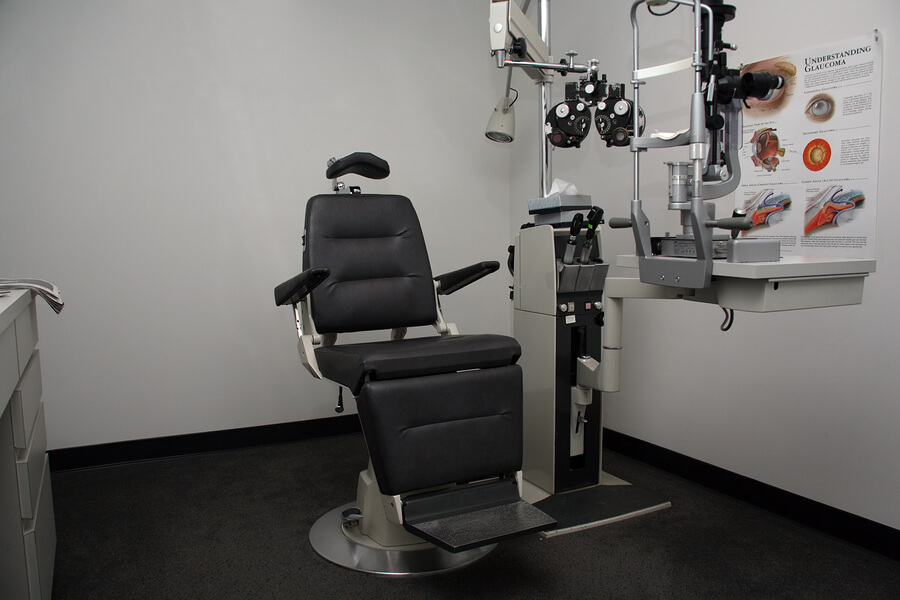
Monitoring Eye Health for Overall Well-being
Eye exams go beyond vision correction and identification of eye conditions. They serve as a window into your overall health, offering valuable insights into potential systemic conditions and diseases. Let's explore how eye exams help monitor your eye health and contribute to your overall well-being:
Diabetes and Diabetic Retinopathy
Diabetes can have a profound impact on the eyes, particularly with a condition called diabetic retinopathy. Regular eye exams allow eye care professionals to detect early signs of diabetic retinopathy, such as damaged blood vessels in the retina. By monitoring these changes, appropriate interventions, including medical management and lifestyle modifications, can be implemented to prevent vision loss and manage diabetes effectively.
Hypertension (High Blood Pressure)
High blood pressure can lead to various eye complications, including hypertensive retinopathy and retinal vein occlusion. During an eye exam, changes in the blood vessels in the retina can be observed, potentially indicating the presence of hypertension. Detecting these signs allows for early intervention, ensuring that appropriate measures are taken to manage blood pressure levels and protect overall health.
Autoimmune Disorders
Certain autoimmune disorders, such as rheumatoid arthritis and lupus, can affect the eyes and cause inflammatory conditions like uveitis and scleritis. Regular eye exams enable the detection of these ocular manifestations, facilitating timely medical intervention and management of the underlying autoimmune condition.
Thyroid Disorders
Thyroid conditions, such as hypothyroidism and hyperthyroidism, can impact eye health. Graves' disease, an autoimmune condition associated with hyperthyroidism, can lead to thyroid eye disease, causing symptoms like bulging eyes (proptosis), dryness, and eye irritation. Eye exams aid in the identification and monitoring of these ocular manifestations, allowing for appropriate treatment and management alongside thyroid care.
Cardiovascular Health
The health of blood vessels in the retina can provide insights into your cardiovascular well-being. Narrowed or damaged blood vessels in the retina may indicate potential cardiovascular issues. By detecting these changes during an eye exam, your eye care professional can recommend further evaluation and collaborate with other healthcare providers to address any underlying cardiovascular concerns.
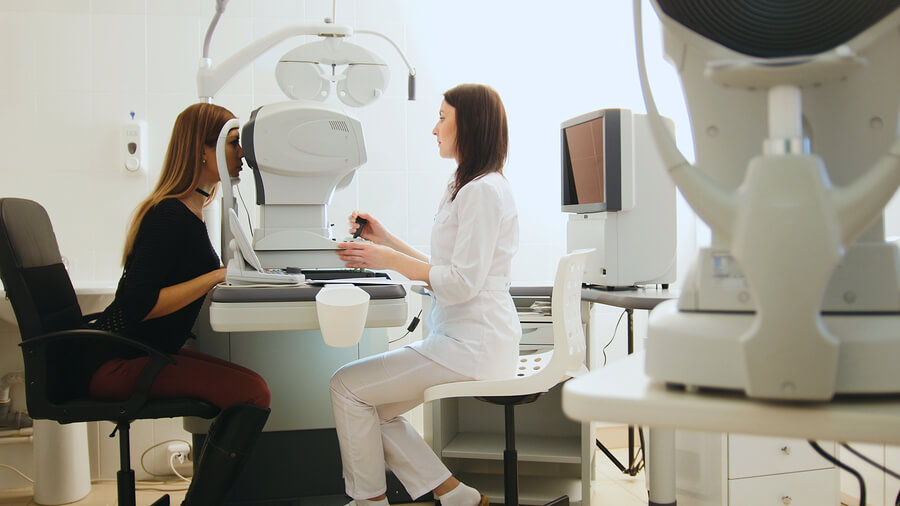
Determining the Recommended Frequency of Eye Exams
The frequency of eye exams varies based on several factors, ensuring that your eye care is personalized and optimal. While the general guideline suggests a comprehensive eye exam every two years, it is essential to consult with your eye care professional to determine the ideal frequency for your individual circumstances. Factors that may indicate the need for more frequent eye exams include:
Age
As we age, the risk of developing age-related eye conditions increases. Adults over the age of 60 are generally advised to have annual eye exams. This age group is more susceptible to conditions such as cataracts, glaucoma, macular degeneration, and other vision changes that can impact daily life. Regular eye exams help monitor any age-related changes in vision and enable timely intervention.
Existing Eye Conditions
If you have pre-existing eye conditions, such as glaucoma, diabetic retinopathy, or macular degeneration, regular eye exams become even more critical. These exams allow for close monitoring of the condition's progression and effective management. Depending on the severity and stability of the condition, your eye care professional may recommend more frequent exams to ensure optimal treatment outcomes.
Medical History
Family history plays a crucial role in determining the frequency of eye exams. If you have a family history of eye diseases, such as glaucoma or macular degeneration, your risk of developing these conditions may be higher. In such cases, more frequent eye exams are often recommended to detect any early signs and initiate preventive measures. Additionally, certain systemic conditions, like diabetes or autoimmune disorders, may require closer monitoring of eye health due to their potential impact on vision.
Occupational or Environmental Factors
Occupational or environmental factors can also influence the recommended frequency of eye exams. Certain professions or hobbies may expose individuals to increased risks of eye strain, dryness, or injury. For example, jobs that involve extensive computer use, prolonged near work, exposure to harmful chemicals, or activities in dusty or debris-filled environments may necessitate more frequent eye exams to monitor eye health and address any related issues promptly.
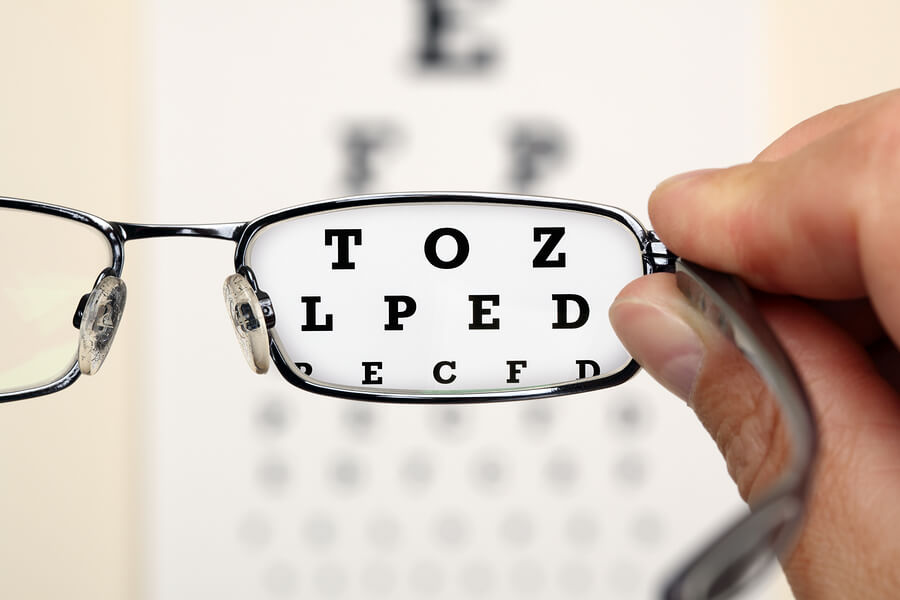
Exploring the Eye Exam Process
Embarking on an eye exam can sometimes feel overwhelming, but understanding the process can help ease any apprehension. Let's delve into the different stages of a typical eye exam to provide a comprehensive overview:
Patient History
The eye care professional will initiate the examination by gathering your medical history. This includes asking questions about any existing eye conditions, previous eye surgeries, family history of eye diseases, and any symptoms or concerns you may have. Providing accurate and detailed information allows the eye care professional to tailor the examination to your specific needs.
Visual Acuity Test
The visual acuity test assesses your ability to see and read letters or symbols on a standardized eye chart. You will be asked to cover one eye at a time and read progressively smaller lines of characters. This test helps determine the clarity and sharpness of your vision and whether you require corrective lenses for nearsightedness, farsightedness, or astigmatism.
Refraction Test
If the visual acuity test reveals the need for corrective lenses, a refraction test will be conducted. During this test, the eye care professional utilizes a phoropter or a trial frame with different lenses. They will ask you to look through various lens combinations while focusing on an object, and you will provide feedback on which lenses provide the clearest vision. This process helps determine the precise lens prescription needed to correct any refractive errors.
Ocular Health Assessment
The ocular health assessment involves a series of evaluations to examine the various structures of your eyes. The eye care professional will use specialized instruments, such as a slit lamp biomicroscope, to assess the cornea, iris, lens, retina, and optic nerve. This comprehensive examination allows for the identification of any abnormalities, signs of disease, or other eye health concerns. It enables the eye care professional to detect conditions like dry eye syndrome, cataracts, macular degeneration, diabetic retinopathy, and more.
Intraocular Pressure Measurement
Intraocular pressure (IOP) measurement is crucial for assessing the risk of glaucoma. The eye care professional will use a tonometer to measure the pressure within your eyes. This painless procedure helps detect early signs of elevated IOP, which could indicate glaucoma, a condition that damages the optic nerve if left untreated.
Pupil Dilation
In certain cases, your eye care professional may choose to dilate your pupils using special eye drops. Dilating the pupils allows for a more comprehensive evaluation of the retina and optic nerve. By enlarging the pupils, the eye care professional gains a better view of the back of the eye, facilitating the detection of conditions such as macular degeneration, diabetic retinopathy, retinal tears, or detachments. Pupil dilation may temporarily cause blurry near vision and increased sensitivity to light, but these effects wear off over time.
Discussion of Findings and Recommendations
Once the examination is complete, the eye care professional will discuss their findings with you. They will explain any diagnosed conditions, provide insights into your eye health, and offer recommendations for treatment or management, if necessary. This may include discussing lifestyle changes, prescribing corrective lenses, suggesting further diagnostic tests, or referring you to a specialist for specialized care. Additionally, they may recommend a follow-up schedule tailored to your specific needs to monitor any conditions or changes over time.
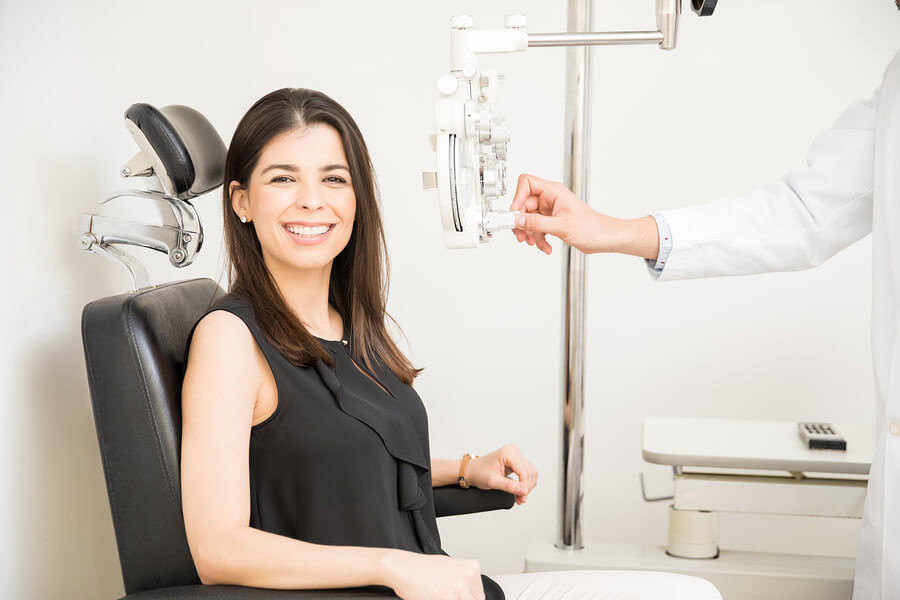
Benefits of Pediatric Eye Exams
Ensuring optimal eye health in children is paramount, and regular eye exams play a pivotal role in their overall development. Let's delve into the key reasons why pediatric eye exams are crucial:
Early Detection of Vision Problems
Children may not always recognize or effectively communicate vision problems or changes in their vision. Regular eye exams enable eye care professionals to identify and diagnose various vision issues, including refractive errors like nearsightedness, farsightedness, and astigmatism, as well as conditions like amblyopia (lazy eye) and strabismus (crossed eyes). Early detection of these vision problems is essential as it allows for timely intervention and treatment, minimizing the impact on a child's learning abilities, development, and social interactions.
Monitoring Visual Development
Pediatric eye exams serve as a comprehensive assessment of a child's visual development from infancy through their formative years. These exams track the progression of visual milestones and help detect any deviations or abnormalities in visual acuity, eye alignment, focusing abilities, and depth perception. By closely monitoring visual development, eye care professionals can identify potential issues and intervene at the earliest stages to ensure appropriate management and prevent long-term vision problems.
Eye Health Maintenance
Pediatric eye exams not only focus on visual acuity but also encompass a thorough assessment of overall eye health. Eye care professionals examine the various structures of the eye, including the cornea, lens, retina, and optic nerve. This comprehensive evaluation helps detect any signs of eye conditions or diseases that may affect children's eye health. Early detection and appropriate treatment or management strategies can help mitigate the risk of vision loss or complications.
Ensuring Academic Success
Clear vision is paramount for a child's academic success. Undiagnosed or uncorrected vision problems can significantly impact a child's learning abilities, concentration, and overall academic performance. Regular eye exams play a crucial role in identifying and correcting vision issues that may hinder a child's educational journey. By addressing these problems early on, children can experience improved visual acuity, enhanced focusing abilities, and optimized visual comfort, allowing them to excel academically.
Taking Control of Your Eye Health
Maintaining optimal eye health extends beyond regular eye exams. By adopting healthy habits and making conscious choices, you can actively promote the well-being of your eyes. Here are essential steps you can take to take control of your eye health:
Practice Healthy Habits
Nourishing your body with a balanced diet rich in eye-friendly nutrients is crucial for supporting good vision. Include foods high in vitamins A, C, and E, such as leafy greens, citrus fruits, carrots, and nuts. Additionally, incorporate omega-3 fatty acids into your diet through sources like fatty fish (salmon, mackerel), flaxseeds, and chia seeds. These nutrients play a vital role in maintaining the health of your eyes and reducing the risk of age-related vision problems. Remember to stay hydrated by drinking an adequate amount of water daily.
Protect Your Eyes from UV Rays
Ultraviolet (UV) rays from the sun can be harmful to your eyes. When spending time outdoors, especially during peak sunlight hours, wear sunglasses that provide 100% UV protection. Look for sunglasses labeled with UV400 or provide both UVA and UVB protection. Additionally, consider wearing a wide-brimmed hat for added sun protection. Even on cloudy days, UV rays can still penetrate the atmosphere, so it's important to protect your eyes year-round.
Use Protective Eyewear
Engaging in activities that pose a risk to your eyes requires the use of protective eyewear. Whether you're working with power tools, playing sports, or participating in hobbies that involve potential eye hazards (e.g., chemicals, flying debris), ensure you wear appropriate protective eyewear. Safety goggles, glasses, or face shields designed for specific activities can shield your eyes from potential injury and reduce the risk of eye trauma.
Follow the 20-20-20 Rule
If you spend prolonged periods on digital devices or engage in visually demanding tasks, such as reading or writing, it's essential to give your eyes regular breaks. Adhere to the 20-20-20 rule: Every 20 minutes, look away from the screen or task and focus on an object approximately 20 feet away for about 20 seconds. This practice helps reduce eye strain, eye fatigue, and dryness associated with extended screen time or close-up work.
Quit Smoking
Smoking has detrimental effects on overall health, including a heightened risk of eye diseases. The chemicals in tobacco smoke can increase the likelihood of developing cataracts, macular degeneration, and optic nerve damage. Quitting smoking is a powerful step toward protecting your eyes and promoting better eye health. Seek support from healthcare professionals, join smoking cessation programs, or utilize resources available to help you quit.
Clearing Common Misconceptions about Eye Exams
“I Have Perfect Vision, so I Don't Need an Eye Exam”
Even if you have excellent vision and no noticeable symptoms, it is still crucial to have regular eye exams. Many eye conditions, such as glaucoma and macular degeneration, can develop silently without causing noticeable changes in vision until they reach advanced stages. Regular eye exams allow for early detection and proactive management, ensuring the preservation of your vision.
“I Only Need an Eye Exam When I Have Eye Problems”
Waiting until you experience eye problems or noticeable vision changes before scheduling an eye exam can potentially delay diagnosis and treatment of underlying issues. Comprehensive eye exams are designed to detect eye conditions in their early stages, often before symptoms are present. By proactively scheduling regular eye exams, you can maintain optimal eye health and prevent potential vision loss.
Conclusion: Prioritizing Eye Health through Regular Exams
Regular eye exams are vital for maintaining healthy vision and overall well-being. They enable early detection of eye conditions, facilitate appropriate management, and provide insights into potential underlying health issues. While the frequency of eye exams may vary based on individual factors, it is important to consult with your eye care professional to determine the optimal schedule. By prioritizing regular eye exams, you invest in the long-term health of your eyes and ensure a lifetime of clear vision.
Sources
- https://www.nidirect.gov.uk/news/importance-getting-eyes-tested
- https://www.optometrists.org/general-practice-optometry/guide-to-eye-exams/why-are-annual-eye-exams-important/
- https://www.allaboutvision.com/eye-exam/importance.htm
- https://www.news-medical.net/health/Importance-of-Regular-Eye-Checks-Procedure.aspx

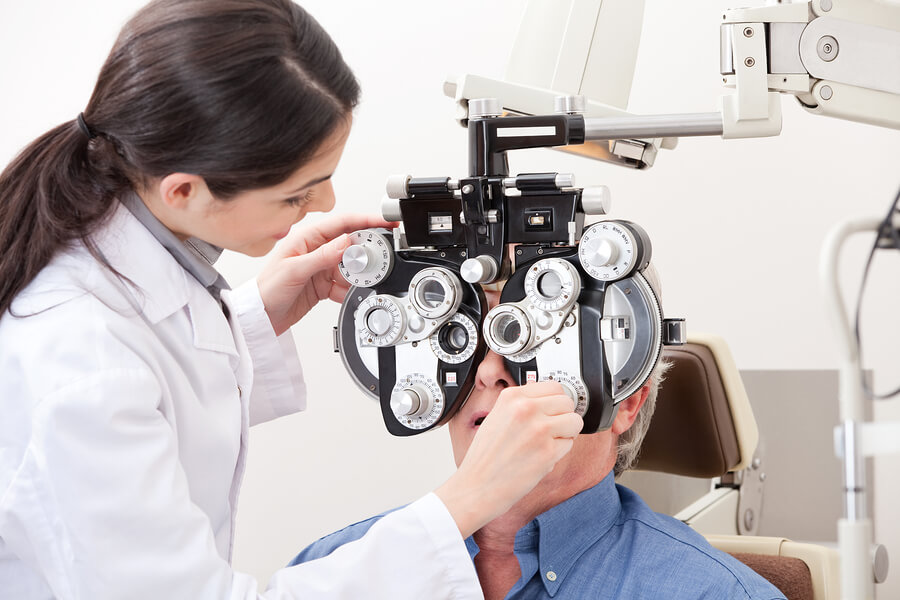


Comments
Loading…